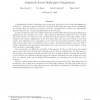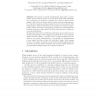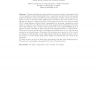143 search results - page 8 / 29 » A Range Test Secure in the Active Adversary Model |
STOC
1996
ACM
14 years 23 days ago
1996
ACM
A fundamental problem in designing secure multi-party protocols is how to deal with adaptive adversaries i.e., adversaries that may choose the corrupted parties during the course ...
ESORICS
2007
Springer
14 years 2 months ago
2007
Springer
Abstract. We propose a general transformation that maps a cryptographic protocol that is secure in an extremely weak sense (essentially in a model where no adversary is present) in...
CCS
2011
ACM
12 years 8 months ago
2011
ACM
We develop a flexible information-flow type system for a range of encryption primitives, precisely reflecting their diverse functional and security features. Our rules enable e...
TCC
2009
Springer
14 years 9 months ago
2009
Springer
The first and still most popular solution for secure two-party computation relies on Yao's garbled circuits. Unfortunately, Yao's construction provide security only again...
CRYPTO
2001
Springer
14 years 1 months ago
2001
Springer
We present a very efficient multi-party computation protocol unconditionally secure against an active adversary. The security is maximal, i.e., active corruption of up to t < n/...



